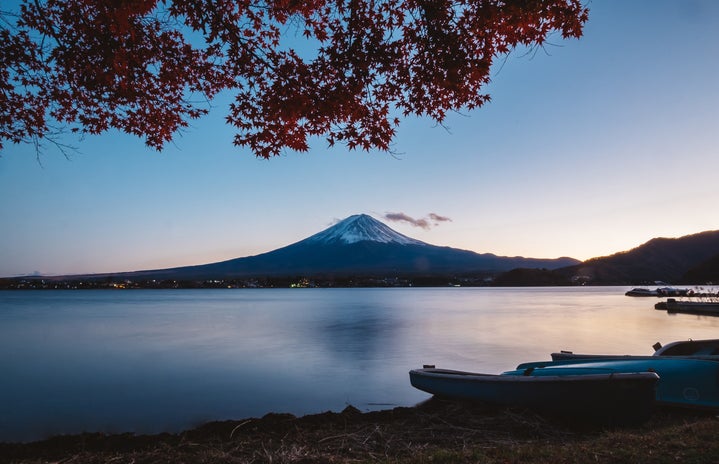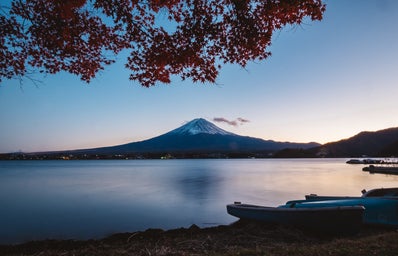Warning: descriptions of war crimes are graphic.
When we think of imperialism, Japan probably isn’t the first country that comes to mind. The title of imperialism is reserved for Western countries, like the U.S. or Great Britain, whose brutal colonizing regimes extended across the globe for centuries. But Japan cannot be forgotten in that long list of violent imperial powers just because our modern perception of the nation is clouded by cute animations and extraordinarily polite manners. While there is no doubt that Japan is a country filled with beautiful cherry blossoms, anime, manga, and amazing sushi, people often forget that it is also a country whose history is littered with colonization, genocide, and imperialism.
In short, Japan may not be what you think it is.
In America, it’s hard for people to recognize Japan for what it truly is because all Asians, or at least all Eastern Asians, are categorized under one massive umbrella of Asian American, without realizing the major differences between ethnic groups within our community. Instead, the underlying, ignorant excuse of “all Asians are the same” is slapped on our community despite the deep, historical tensions entrenched within numerous cultures. Many of these are due to Japan’s imperial reign that terrorized large areas of Asia, primarily in Korea and China. While my family has never been directly affected by Japan’s colonialism because they never reached the provinces that they lived in, what they did to millions of other Chinese and Korean people is already enough to completely rebuke their imperialist regime. It’s hard, if not impossible, to summarize all the atrocities Japan has committed, but let’s try to look at a few.
Being the daughter of Chinese immigrants, growing up, my parents educated me on China and Japan’s difficult relationship by first teaching me about the Nanjing Massacre, also known as the Rape of Nanjing. I still remember the long night spent at our kitchen table where they taught me what exactly occurred at the old capital of China, and what’s happened since then, because they wanted to drive home the idea that Japan’s actions cannot be excused.
In short, in 1937, over a period of only six weeks, Imperial Japanese forces invaded the southern Chinese city of Nanjing. During this time, hundreds of thousands of Chinese men, women, and children were savagely murdered (between 200,000 to 300,000), and between 20,000 and 80,000 women were raped. Nanjing, which used to be the nation’s capital, was left in total destruction and took decades for the city to recover from its ruins.
While some may think: “this was wartime; this is just what happens during a war,” I’d like to provide an example of one of the several war crimes Japan committed during the entire Nanjing Massacre to emphasize the brutality of the Imperial Japanese Army and their malicious mentality. While on the march to invade and take over Nanjing, two Japanese officers created a contest. They created this contest to see who could kill 100 Chinese people first, using their swords. Once arriving at Nanjing, they realized none had reached the contest’s goal of 100, so they proceeded to continue the game, and following combat, they were unable to distinguish who had reached 100 kills first, so they raised the total to 150. This single war crime alone allows us to clearly see that Imperial Japan wasn’t merely following orders. They were out to invade, murder, and conquer, just like any other imperial power.
When we learned about World War II in school, the war crimes that we were taught focused on Germany and its deplorable Nazis, so I hadn’t learned about comfort women except from my own research and discovery, and I’m guessing a lot of people still don’t know exactly what they are.
Comfort women were women that the Japanese Army kidnapped and forced into sexual slavery. These women were from all over Southeast Asia but predominantly were from Korea and China. They kidnapped 100,000 to 300,000 women, forcing them into ruthless, violent servitude. Frankly, I could write a completely different article, just about comfort women, because this entire war crime really cannot be condensed into one paragraph—it probably wouldn’t even be enough to write a whole article about these women. The details of this enormous act of savagery are far too graphic, as what the Japanese Army did can only be described as barbaric and wicked. On the whole, all of these comfort women were ripped away from their families and homes, mentally and physically violated, and treated in completely inhumane, vicious ways. Up to 75% of the comfort women died while being kept as sexual slaves in Japanese brothels, due to their cruel conditions, numerous assaults and beatings, and diseases and infections they contracted from being used for sexual servitude. In Saipan, many comfort women were seen committing suicide by jumping off cliffs. In 1993, the UN’s Global Tribunal on Violations of Women’s Human Rights estimated that at the end of World War II, 90 percent of the “comfort women” had died.
There are countless Japanese atrocities I didn’t even address, such as Unit 731, in which the Japanese Army conducted human experimentation and biological and chemical warfare experiments on captured Chinese people, but there are some extremely important takeaways. Japanese imperialism did not start with World War II. Japan had been invading China for literally centuries, and let’s not forget how Japan completely colonized Korea, occupying the entire nation, abusing and oppressing Korean civilians, and working to wipe out all Korean culture, language, and history. One article is just not enough to examine all the horrors Japan has perpetrated against East and Southeast Asia.
But what sets Japan apart from Germany, an imperialist country that also has a long and violent history of being the oppressor? Why am I taking the time to solely condemn Japan? The answer is clear, and quite honestly, absolutely despicable. While Germany has taken the time and effort to acknowledge its horrific history and apologize to those it has terrorized, Japan has not. The thing that my parents stressed over and over when educating me on the Nanjing Massacre was how Japan never recognized it ever happened, much less apologized for it.
This is a common denominator in basically all Japanese atrocities. The country has never admitted its faults, and this is probably due to the fact that they destroyed and burned an overwhelming majority of their reports which documented all their war crimes. In fact, that’s why the numbers stating how many people were murdered or how many women were raped have such large ranges—because even historians aren’t sure about the numerical accuracy since the Japanese army destroyed most of the reports and documentation. Japan made sure to get rid of all evidence that would prove their shameful actions to the world, and in turn, Japan’s gruesome history has never been taught to Japanese students, leaving the entire population completely unaware of the awful things their country has done. Unlike Germany, in which the Holocaust and Nazis are incorporated in their education to ensure nothing like that ever happens again, Japan’s right-wing nationalism continues to grow. Because the country does not recognize crimes like the Nanjing Massacre or the entirety of comfort women, and they are ignored in Japanese education curriculums, it is easy to believe none of it ever happened.
To this day, many Japanese people have never even heard of comfort women. Those that have most likely believe that it wasn’t sexual slavery, it was actually their choice to go to Japanese brothels and then were generously compensated. Twisting the truth like this is a common occurrence when Japanese people are questioned about their history. Instead of the massacre of Chinese families, the Japanese Army actually went to Nanjing just solely to improve China. Instead of the violent occupation of Korea for decades, Japan was merely extending help to refine and advance the country. If it’s not the concealing of the truth, it’s outright denial. Among the Japanese right-wing, an argument that is often used is that the Nanjing Massacre is all Chinese propaganda or the crimes committed by Japan are purely fabricated by Koreans.
This is what happens when a country is not held accountable. Today, racism against Koreans and Chinese in Japan grows along with the frightening nationalism in Japan, and until Japan can take responsibility for its actions, racism and nationalism will continue to grow. You don’t have to have been affected by Japanese imperialist terror to reproach their actions. Japan cannot continue to be seen as a harmless country, as its facade of innocence is used to camouflage its callous history. Japan prides itself in its history—but only the history they want to remember, as they pick and choose the things they wish to recognize and accept. The country boasts patriotism, as it should because the country and its culture are absolutely beautiful, but to be truly patriotic, they need to recognize their faults, because the shortcomings of a country are a vital aspect of a country’s history.
When Japan refuses to acknowledge their atrocities, they are refusing to acknowledge their own history, and if we keep believing in their disguise of guiltlessness, we are excusing their dreadful deeds at the expense of other countries, their people, and the generational trauma that many Chinese and Koreans still actively face.
Want to keep up with HCBU? Make sure to like us on Facebook, follow us on Instagram, check out our Pinterest board, and read our latest Tweets!



